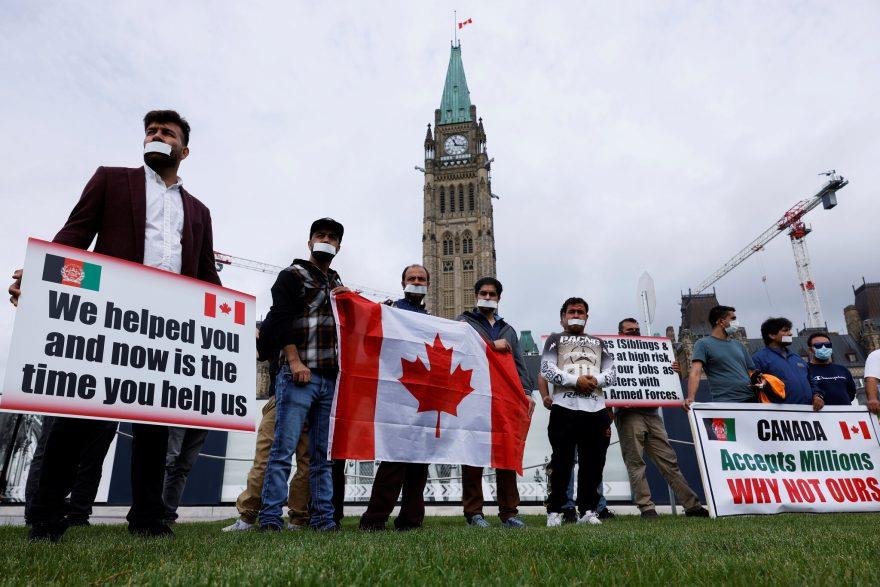
Canada Reduces Immigration In 2025, Leaving Many Afghan Refugees Uncertain
In a major announcement today, Canadian Prime Minister Justin Trudeau revealed a significant reduction in the country's immigration targets, marking a notable shift from Canada's historically welcoming stance. The new policy will lower the number of permanent residents admitted in 2025 to 395,000, down from the previous target of 500,000, with further reductions planned through 2027. This decision comes as the government attempts to address growing concerns among Canadians over housing shortages, healthcare strain, and rising unemployment.
Sharp Reductions to Immigration Plans
Prime Minister Trudeau acknowledged that the country's post-pandemic immigration policies, which aimed to address labor shortages, may have outpaced the capacity to provide adequate services.“We didn't get the balance quite right,” Trudeau admitted during today's announcement. The new policy aims to give provinces time to expand essential services like housing and healthcare while temporarily pausing rapid population growth.
In addition to reducing permanent resident admissions, Canada will also lower the number of temporary residents, including international students and foreign workers, by about 30,000 in 2025. This adjustment represents a major departure for a country that has relied on newcomers to support its workforce and drive population growth for decades.
Impact on Afghan Refugees
The policy change is particularly concerning for Afghan refugees, many of whom are currently living in neighboring countries such as Pakistan, Iran, Tajikistan, and India. Over the years, Canada has been a key destination for Afghan refugees seeking to escape conflict and instability in their home country. However, the sharp reduction in immigration quotas may leave many Afghan refugees uncertain about their resettlement prospects.
Afghan refugees, who have already faced difficult conditions in countries with limited resources to support them, have long looked to Canada for a fresh start. Government-sponsored and private resettlement programs, often facilitated by the United Nations High Commissioner for Refugees (UNHCR), have provided hope for thousands. With Canada's decision to cut both permanent and temporary immigration numbers, the chances for Afghan families to find a new home in Canada may now be in jeopardy.
Widespread Criticism of the Policy
The immigration reduction has sparked criticism from migrant rights advocates and humanitarian groups. Organizations like the Migrant Rights Network have accused the government of unfairly placing blame on immigrants for Canada's housing and social service challenges.“Migrants are not responsible for Canada's housing crisis or strained healthcare systems,” the group said in a statement. They argue that reducing immigration will do little to address systemic issues and will instead harm vulnerable populations, including refugees.
However, the Canadian government maintains that the changes are necessary to ensure long-term economic and social stability. The new immigration plan emphasizes in-country applicants, with over 40% of permanent residents in 2025 expected to come from individuals already living in Canada as temporary residents. This approach, according to Trudeau, will help ease the immediate strain on housing and public services while still supporting the labor market.
Afghan Refugees and Regional Implications
For Afghan refugees residing in Pakistan, Iran, Tajikistan, and India, Canada's immigration cuts could force them to reconsider their resettlement options. These neighboring countries host millions of Afghan refugees, but they often struggle with providing adequate resources to manage the influx. Canada had been seen as a viable resettlement option, but the new policy may reduce opportunities for Afghans hoping to escape their precarious living situations.
The cuts also come at a time when global displacement is at a record high. According to the United Nations, over 100 million people have been forcibly displaced worldwide, and Afghanistan remains a major contributor to this figure due to its ongoing conflict and political instability.
Conclusion
Canada's decision to reduce immigration targets marks a turning point in its approach to immigration and refugee resettlement. While the government aims to address domestic concerns, this policy shift poses significant challenges for Afghan refugees and other vulnerable groups seeking to rebuild their lives. As Afghan refugees living in neighboring countries face mounting uncertainty, Canada's role in global migration and resettlement will continue to be closely scrutinized. The impact of these cuts on Afghan families and their future prospects remains to be seen.
ShareFacebook Twitter WhatsApp Email Print Telegram
Legal Disclaimer:
MENAFN provides the
information “as is” without warranty of any kind. We do not accept
any responsibility or liability for the accuracy, content, images,
videos, licenses, completeness, legality, or reliability of the information
contained in this article. If you have any complaints or copyright
issues related to this article, kindly contact the provider above.


















Comments
No comment